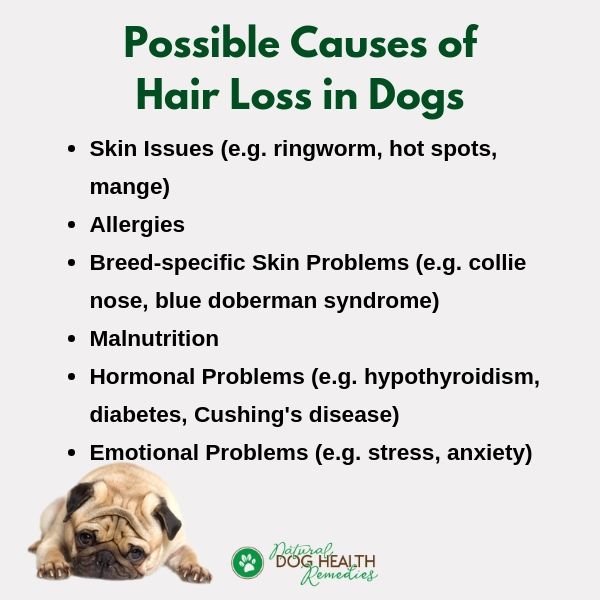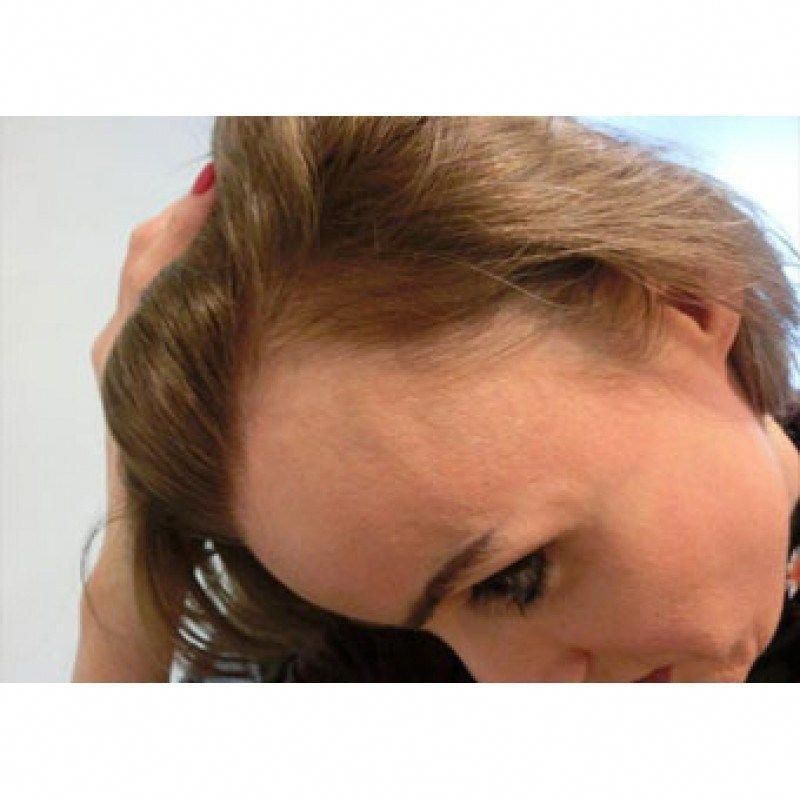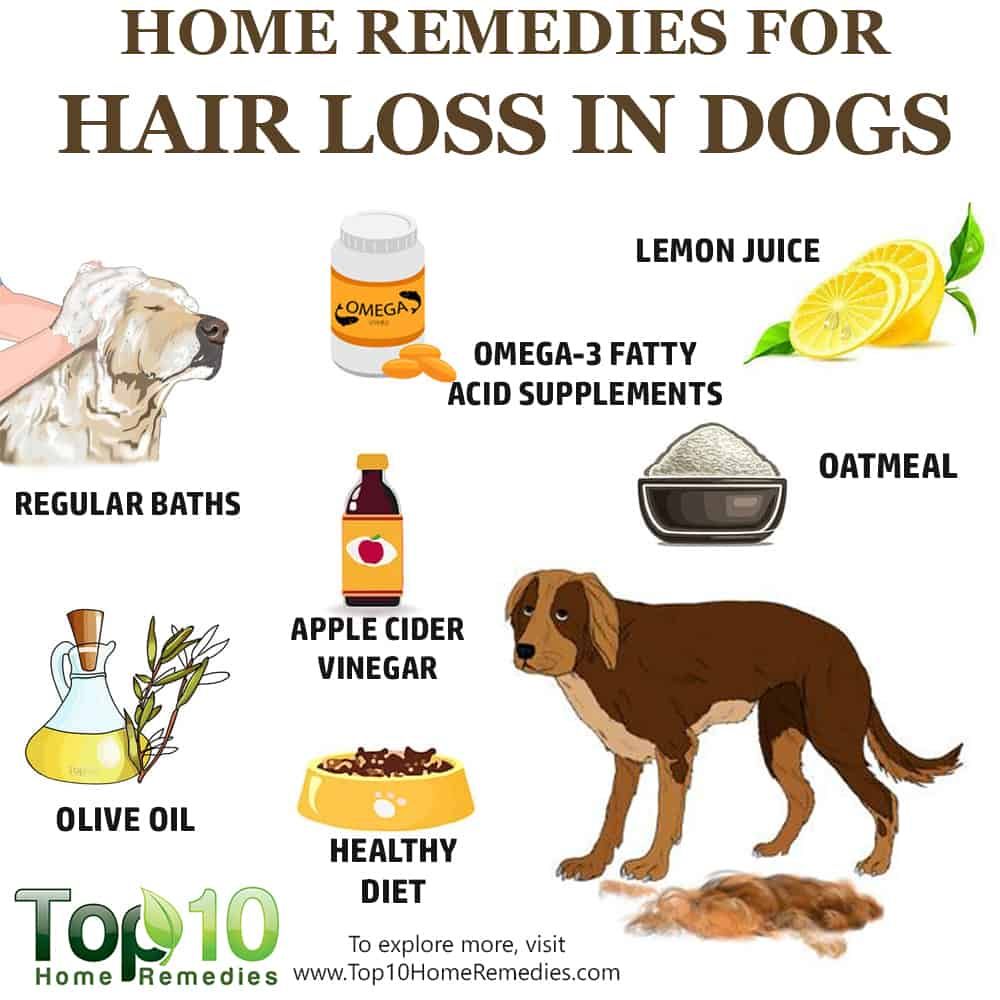Treatments Options: Making Your Dog Comfortable
Depending on your dogs specific skin condition, there are a number of treatment options. Be sure to consult with your vet first before administering any type of treatment, dietary changes or therapeutic remedies.
- Diet: If your vet believes your dogs chronic skin condition is linked to food allergies, choosing the right dog food is vital to your pups well-being. You may want to discuss supplements as an addition to his diet.
- Hydrocortisone Shampoos & Sprays: If your fuzzy friend suffers from excessive licking and itchy skin, ask your vet to recommend safe hydrocortisone-based sprays to provide relief. Never use shampoos or products intended for humans, as their ingredients are often too harsh for their delicate skin.
If you notice bald spots, excessive hair loss or other skin abnormalities anywhere on your dogs body, be sure to speak to your vet immediately, particularly if symptoms are accompanied by itching, irritated or infected skin, a foul odor, or changes in his behavior.
It may be indicative a relatively minor skin condition or signal an underlying health issue, but the only way to be certain is to consult with your veterinarian. With proper treatment, a healthy diet, and careful monitoring of your canines hair loss condition, you can typically manage further dog hair loss and provide him with sources of relief during any episodes.
How Vets Diagnose Alopecia In Dogs
A thorough physical exam by your veterinarian is the single most important step in diagnosing the cause or causes of alopecia. It is seldom a quick fix when it comes to skin disorders in dogs. Your vet will take multiple factors into consideration before determining what diagnostics are appropriate in your dogs case .
Unfortunately, there is no simple recipe to fix alopecia in dogs. Figuring out the cause is essential to choosing treatment options. Also, many causes of alopecia are ongoing conditions that will need periodic medications or other treatments. Understanding this before you even make the vet appointment will go a long way in saving you from frustration if symptoms return in the future.
When seeing your veterinarian, be prepared to answer thorough questions about your dogs history, including:
-
Number of pets in the home
-
Degree of pruritus
-
Dogs job
-
Parasite medications
-
Prior health issues or blood work abnormalities
Once your vet has these answers, they can examine your pet and determine possible causes. Your vet will check closely for any evidence of fleas or flea dirt , ticks, or saliva-stained areas such as the feet, tail base, and flanks.
They will also note any unusual odors. Yeasty feet smell like Fritos, and ears have unique smells depending on yeast or bacteria. Your dogs skin may have a waxy or greasy feel, which will help decide what topical therapies to use.
When To See Your Vet For Your Dogs Hair Loss
So once you notice excessive fur loss in your dog, when should you take them to the vet?
While you may be tempted to tackle the issue on your own at home, we always suggest reaching out to your vet for guidance.
Overall skin and coat health management can always be dealt with at home, but fur loss to the point of bald spots should always receive professional care.
Not only should hair loss in dogs receive guidance from a veterinary professional, but this is especially true if your dog is displaying any other signs of skin irritation.
A trip to the vet will only help you solve the issue sooner, as they can offer insight you may not have received otherwise.
If your dogs current skin situation is enough to cause concern, it always warrants a trip to the vet.
Don’t Miss: Can Jardiance Cause Hair Loss
Hair Loss In Dogs: Most Common Causes And Solutions
Hair loss in dogs is a common concern for pet parents and may be accompanied by other skin problems such as itching, scratching, or redness. There are many reasons why your pup might be losing their fur, some mild and easily treatable, others linked to more severe medical conditions that require long-term management. Regardless, getting the correct diagnosis from a veterinarian is crucial for a successful outcome.
Severity:
Mild to moderate to severe
Table of Content
- Requires diagnosis by a veterinarian
- Other symptoms may include itching, redness, or pain
- Transmission is possible between animals or between animals and people in some cases
- Resolves in days to months or may require lifelong treatment or management
- Diagnosis requires a physical examination and/or laboratory tests, skin scrapes, cytology, culture and sensitivity, biopsy.
Conflict Of Interest Declaration

The authors declare that none of their collaborations influenced their work on this Consensus. Collaborative Research: Antech Laboratories , Boehringer Ingelheim Vetmedica, Inc. , IDEXX Laboratories , Zoetis Other: AKCCHF/SCWTCA/SCWTAC GraysonJockey Club , Kindy French Foundation , Maddieâs Fund , NIH , Shipley Foundation Consultant or Sponsored CE events: Aratana , Boehringer Ingelheim Vetmedica, Inc. , Heska , IDEXX Labs , Merck , Merial , and Zoetis
Also Check: Can Low Thyroid Cause Hair Loss
Recovery Of Hair Loss In Dogs
Hair loss may need to be treated more than once, depending on your pets predisposition to skin infections. Always administer treatment according to the veterinarians instructions. Follow up appointments may be necessary to ensure the problem is resolving and any infection is clearing. Monitor your pets skin and hair regrowth and communicate any changes or concerns to the veterinarian so they can adjust treatment accordingly.
Hair loss can be expensive to treat. If you suspect your dog has hair loss or is at risk, start searching for pet insurance today. Brought to you by Pet Insurer, Wag! Wellness lets pet parents compare insurance plans from leading companies like PetPlan and Trupanion. Find the pawfect plan for your pet in just a few clicks!
How Can You Prevent Dog Hair Loss
In summary, to prevent hair loss in your dog:
- Ensure you keep up with a schedule of regular preventatives like flea and tick treatments and de-worm your dog on a regular basis.
- Feed your dog high quality food that gives your dog enough nutrients and minerals. Avoid foods that have artificial flavours, sugar and other by-products.
- Prepare your dog for stressful situations that cant be avoided or try not to expose your dog to stressful situations that they may lose hair over.
- Take your dog for annual health check-ups at the vet.
- Use natural dog shampoos and conditioners to prevent dry skin and irritations.
Also Check: Can Otezla Cause Hair Loss
Specific Tests For Skin Disease
If your dog is suffering from skin disease and has been losing hair or scratching, there are several tests your veterinarian may recommend performing. These include:
- Skin scrapings to look for evidence of the mites that cause mange
- Skin cytology looking for evidence of yeast and bacterial infections in the skin
- Fungal cultures that check for ringworm and other fungal infections
- Skin biopsies if skin cancer or other serious skin disease is suspected
What Is Alopecia In Dogs
Alopecia, also known as hair loss, is a very common condition in dogs. Alopecia is different from shedding, which is a normal part of your dogs hair growth cycle and depends on the dogs breed. Alopecia refers to either thinning hair or spots of hair loss . Where the hair loss occurs can depend on the underlying cause.
Also Check: Does Magnesium Help With Hair Loss
Treatment Of Hair Loss Related To Parasites In Dogs
Treatment for the hair loss and elimination of the pest will depend on what parasite was diagnosed. Flea and tick infestation will be treated with medicated shampoo and the application of a preventative medication . Mites may be treated with medicated shampoo/dip and Ivermectin. Your house and yard will need to be be treated for the parasites as well. Your dogs bedding and cloth toys should be washed in hot water. The use of a fogger or a professional exterminator may be necessary. Internal parasites are treated with deworming medication and in this case, the yard and house will also need to be cleaned and sprayed.
If there are other dogs and/or cats in the household they too should be treated for the diagnosed parasite with guidance from your veterinarian. De-wormers and preventative flea and tick medication are different in dogs and cats. Dosage is weight applicable and in addition, using a canine medication and dosage on a cat can be fatal to a feline.
Dogs diagnosed with anemia will need to have B12 injections. Patients that were malnourished will need dietary supplements and vitamins. Your dog may need to wear an E-collar so he does not keep biting or chewing at his skin.
Worried about the cost of Hair Loss Related To Parasites treatment?
Pet Insurance covers the cost of many common pet health conditions. Prepare for the unexpected by getting a quote from top pet insurance providers.
Hair Loss From Skin Conditions Or Infections
Just like humans, dogs can get dry, cracked skin or skin infections. These conditions can cause your dogs skin to be extremely itchy. Dogs will often lick, scratch or itch themselves to relieve the discomfort, and over time this can lead to hair loss.
Dogs with bacterial or fungal skin infections usually have an underlying allergy component as well. Bites from other animals as well as cuts and abrasions can also lead to skin infections.
Also Check: How To Stop Hair Thinning At The Front
How To Prevent Alopecia
Some types of alopecia are preventable while others are out of a dog owner’s control. Using parasite control and making sure any hair accessories are not applied too tightly are the best ways to prevent these avoidable types of alopecia. Other types of alopecia that are due to a genetic or auto-immune cause are not preventable but may be lessened for future generations with selective breeding.
Should I Be Concerned About My Dog Losing Hair

Its normal for your dog to shed and lose hair, but when they start to lose hair in excess, thats when it becomes a problem. There are many conditions that could cause hair loss in dogs. It could be due to something simple, like allergies, or it could be a result of a more serious health condition. So if you start to notice your dog is losing hair more than usual, consult your vet so you can get to the root of their hair loss.
Also Check: How Can I Hide My Thinning Hair
Can Cats Make Your Hair Fall Out
Generally, being around cats will not make your hair fall out. However, a ringworm infection transmitted by a cat can lead to hair loss. Also, if you have an allergy to cats and scratch your scalp enough to damage your hair follicles that can lead to hair loss. This is an uncommon circumstance but possible.
Ringwormis a potential way that a pet can cause hair loss in humans. This fungal infection can occur in dogs, cats, and humans though cats tend to be asymptomatic. Cats can still transmit ringworm even while asymptomatic. Cows, horses, goats, and pigs can also have and transmit ringworm.
Ringworm causes patches of scaly skin with the hair breaking at skin level or just above it. Hair is also prone to being brittle in the affected areas and falls out easily. Ringworm areas will also be tender or painful.
The discomfort from the symptoms can make the affected person want to scratch. Too much scratching can damage hair follicles, leading to permanent hair loss. If treated in a timely manner, the hair loss can be reversed.
Treatment Of Hair Loss In Dogs
Depending on the diagnosis, a variety of treatments are available for dog hair loss.
Worried about the cost of Hair Loss treatment?
You May Like: How To Stop Hashimoto’s Hair Loss
Will Hair Grow Back If Diabetes Is Controlled
If the hair loss is associated with only diabetes, not from any of the mentioned reasons, they will come back. However, you need to adjust your pets diet, lifestyle, and medicine to control diabetes and get its hair back. Once your pets diabetes comes under control, first you will see a reduction in hair loss and then the new ones.
Try Apple Cider Vinegar
Apple cider vinegar is one of those old home remedies that people have been using for many, many years.
So what makes it such a great thing to apply to your dogs skin & hair?
Well, apple cider vinegars acidic nature makes it a natural antifungal & antibacterial. That means you can apply it to any irritated skin to help clean out any of the bad stuff.
You can either dab it on your dogs skin, or try adding some to their bath and use it to refresh their skin all over their body.
Don’t Miss: How To Stop Thinning Hair On Top Of Head Female
Andrews Girl Sandy Needed Surgery To Repair Torn Cruciate Ligaments
Andrew took Sandy for x-rays after she started limping. It was found that she had a torn cruciate ligament in the left leg and needed surgery. After 6 months’ recovery and loading of the other leg, another knee reconstruction was required. Andrew is grateful that Bow Wow Meow were fantastic and and helpful, and seemed to really care about Sandy.
What Is Treatment For Lyme Disease In Dogs
If you suspect your dog may have contracted Lyme disease, it is important to remove the tick as soon as possible. Once this is done, you need to monitor your dogs behavior and keep an eye out for any possible symptoms of Lyme disease in dogs.
Treatment is not for Lyme disease itself, but for the Borrelia bacteria that could attack your dogs system. Depending on how severe the infection is will depend on the amount of treatment and the type of medication that may be prescribed.
Recommended Reading: How To Prevent Hair Loss At Early Age
Treatments For Alopecia In Dogs
Treatment for alopecia in dogs can vary a lot depending on the cause of the condition. Youll need to see your vet to determine the cause of alopecia in your dog.
Antibiotics, antifungals, and steroids are often used topically or orally to treat skin conditions and inflammation. Antihistamines can be used for allergic reactions. Medicated shampoos can treat a number of infections, especially mange.
Flea and tick prevention helps reduce alopecia caused by itchiness, and insulin therapy is the treatment for diabetes. Thyroid medication and hormone therapy can be used to correct some thyroid problems. Surgery may be needed to remove tumors or skin cancer.
If alopecia is a result of your dog chewing and licking, you may need an Elizabethan collar to stop the behavior.
There are also a number of supplements that you can add to your dogs diet that improve coat health. Fish oil, Vitamin A, and Vitamin E can help with dry skin and certain skin infections, and they keep fur shiny and in good shape. However, you should always follow your veterinarians instructions.
Does your dog suffer from alopecia? How do you treat it? Let us know in the comments below!
What Are Hair Loss Related To Parasites

Parasites can be transmitted in boarding kennels, dog parks, grooming facilities, dog friendly facilities and shelters. Some parasites are zoonotic, which means they can be transmitted from an infected animal to humans.
External and internal parasites can cause other very serious conditions such as internal bleeding, anemia, and bacterial infection and can even be fatal. If your dog is experiencing hair loss it is important to take him to the veterinarian. The veterinarian will be able to diagnose the underlying cause for alopecia.
Parasites are organisms that live in or on a host to obtain their nourishment and to reproduce. The infestation of external parasites in dogs can cause the dog to scratch, bite and chew at his skin, which in turn, leads to hair loss. Internal parasites can cause malnutrition in dogs, which can also lead to hair loss. Hair loss in dogs is also referred to as alopecia.
You May Like: What Shampoo Is Good For Thin Oily Hair
What Is Canine Alopecia
Canine alopecia is a medical condition in which there is excessive hair loss in dogs, and which is unrelated to the normal hair shedding and growing cycle as mentioned above.
Alopecia in dogs can be partial and localized , or it can be complete and generalized.
So what causes hair loss in dogs? Read on to find out!
Can I Prevent My Dog From Losing Hair
There are several steps you can take to make it less likely that your dog will experience hair loss. Be sure to:
- Feed a good diet. Since nutrition directly affects your dog’s skin and coat, feeding them a high-quality diet keeps the skin and fur in great shape.
- Consider a dietary supplement. Adding a dietary supplement, like fish oil, to your pet’s diet is a great way to boost skin and coat health with essential omega-3 fatty acids. Native Pet’s all-natural Omega Oil is a great choice.
- Keep your pet on a flea and tick preventative. It’s the easiest way to avoid flea allergies and flea dermatitis, as well as hair loss related to tick bites.
- Groom Fido regularly. Grooming is good for your dog’s skin and fur, and it gives you a chance to check for any skin problems.
Don’t Miss: What Is Good For Thinning Hair